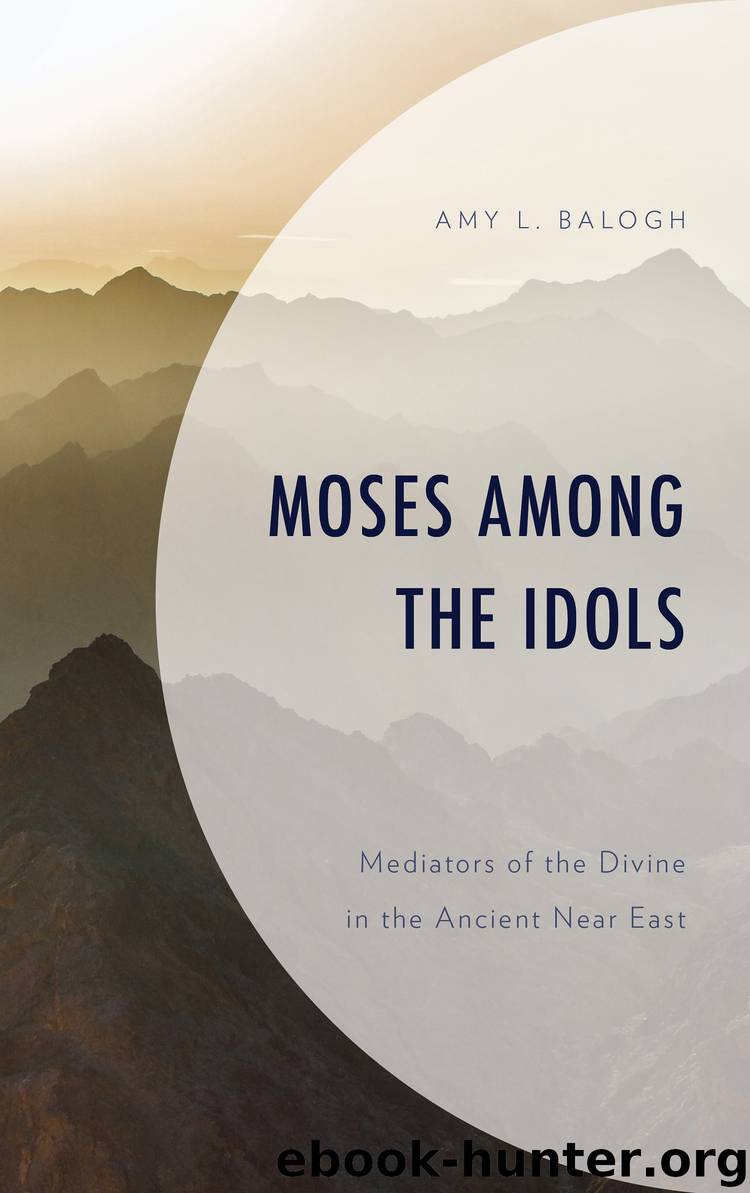Moses Among the Idols by Amy L. Balogh

Author:Amy L. Balogh [Balogh, Amy L.]
Language: eng
Format: epub
Publisher: Fortress Academic (R&L)
Published: 2018-09-03T16:00:00+00:00
Why “Uncircumcised of Lips” (Exod 6:12, 30)
The content and creation language of the opening chapters of Exodus make it clear that the Hebrew people “were fruitful and multiplied” (cf. Gen 1:28; Exod 1:7) in the centuries prior to and during their slavery in Egypt.11 The first half of YHWH’s covenant, the promise that innumerable descendants would come from the line of Abraham, Isaac, and Jacob, is well underway (Gen 15:5; Exod 1:1–12). As 400 years of slavery draw to a close (Gen 15:13–16), it is time for the second promise of the Abrahamic Covenant to be fulfilled—Israel must possess the Promised Land (Gen 15:18–21; Exod 3:7–18) and it is Moses who is going to lead them.
Moses’s task is to initiate and orchestrate the fulfillment of this second promise by bringing the people out of Egypt and into the land of Canaan (Exod 3:8). He is to do this by going to Pharaoh and communicating the word and power of the divine presence that accompanies him (3:10–4:17). However, his mouth proves unable to achieve the desired effect. When Moses first speaks with Pharaoh on behalf of his commission, the confrontation results in a worsening of the quality of life of the Hebrew people and threatens their future presence in the land. In response to Moses’s request to let the people go into the wilderness for three days to sacrifice to YHWH, lest he bring pestilence or violence upon them (5:3), Pharaoh increases the burden of the Hebrews (5:7–9), who are beaten both verbally and physically when they cannot meet the new demands (5:16–17). Furthermore, the people are “scattered throughout all the land of Egypt” (5:13), which prohibits the organization of an exodus, let alone a journey to the Promised Land. In his conversation with Pharaoh, Moses’s mouth inadvertently acts like “those uncircumcised” discussed previously, those who violently threaten Israel’s well-being and possession of the land in other parts of the Hebrew Bible. Moses’s attempt to bring the people out of Egypt pushes them deeper into its grasp.
What keeps Moses from success is not a matter of his will, the idiomatic stiffness of the back of his neck (Deut 10:16), but of initiation. Within the course of the burning bush narrative, Moses asks YHWH repeatedly and in different ways to ensure that he is capable of affecting the desired change in the lived experience of the Hebrew people and each time YHWH makes a promise that ensures Moses’s success, whether it be the promise of his own presence (Exod 3:12), the trust of the people (3:18), miraculous displays of YHWH’s power (3:20), or a series of signs for Moses to perform (4:1–17). When Moses’s initial efforts before Pharaoh fail (5:1–22), the trust of the people is broken (5:20; 6:9). However, YHWH reasserts his promise of deliverance, commands Moses to repeat it to the Hebrews, who now reject him (6:1–9), and demands that Moses approach Pharaoh yet again (6:10–11). Moses’s objection to returning to Pharaoh is not a refusal of his commission, but
Download
This site does not store any files on its server. We only index and link to content provided by other sites. Please contact the content providers to delete copyright contents if any and email us, we'll remove relevant links or contents immediately.
The Daily Stoic by Holiday Ryan & Hanselman Stephen(2706)
The Fate of Rome: Climate, Disease, and the End of an Empire (The Princeton History of the Ancient World) by Kyle Harper(2434)
People of the Earth: An Introduction to World Prehistory by Dr. Brian Fagan & Nadia Durrani(2346)
Ancient Worlds by Michael Scott(2101)
Babylon's Ark by Lawrence Anthony(2068)
Foreign Devils on the Silk Road: The Search for the Lost Treasures of Central Asia by Peter Hopkirk(2054)
India's Ancient Past by R.S. Sharma(1984)
MOSES THE EGYPTIAN by Jan Assmann(1970)
The Complete Dead Sea Scrolls in English (7th Edition) (Penguin Classics) by Geza Vermes(1838)
Lost Technologies of Ancient Egypt by Christopher Dunn(1797)
The Daily Stoic by Ryan Holiday & Stephen Hanselman(1767)
The Earth Chronicles Handbook by Zecharia Sitchin(1743)
24 Hours in Ancient Rome by Philip Matyszak(1676)
Alexander the Great by Philip Freeman(1645)
Aztec by Gary Jennings(1543)
The Nine Waves of Creation by Carl Johan Calleman(1519)
Curse Tablets and Binding Spells from the Ancient World by Gager John G.;(1510)
Before Atlantis by Frank Joseph(1483)
Earthmare: The Lost Book of Wars by Cergat(1466)
